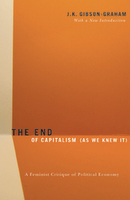The End of Capitalism (As We Knew It): A Feminist Critique of Political Economy

Materialist feminist geographers Katherine Gibson and Julie Graham who write as J.K. Gibson-Graham have reissued their postmodern critique of representations of capitalism and economy. Using an Althusserian lens of over-determination, Gibson-Graham show that capitalism is not an inevitable tendency or hegemonic in diverse post-Fordist societies, as it has often been constituted in triumphalist right-wing discourses or in Marxian analyses, but that alternative non-capitalist economies are possible. Gibson-Graham’s project is to propose a language of the diverse economy incorporating counter-discourses from alternative traditions of economic thought, feminism, and working-class, third-world, and social and community movements such as the Zapatistas in México. For this, they use case studies and deconstruction of essentialist concepts such as class, which they formulate as a process of intersecting sites for gender, orientation, income-status, and other oppression markers. The authors have to be careful not to centralize their privileged white feminist locations in the academies. In analyzing the feminist rape script, for example, which characterizes the domination of MNCs in today’s globalized economy as phallocentric, Gibson-Graham’s study of the semi-conductor industry in southeast Asia leads to their claim that "the economic ‘rape’ wrought by globalization in the Third World is a script with many different outcomes - we might read the rape event as inducing a pregnancy, rather than initiating the death and destruction of indigenous economic capacity." As Gibson-Graham’s next phases are to cultivate subjects for non-capitalist spaces and to build community economies, it is wrong to conclude that the inclusion of academicians in the movement can be sufficiently explained by an "erotics of desirability" on the part of other participants who may see them as exploitative, arrogant, detached and careerist. Some dislocation is needed within western academia and its own discourses before the distances between enunciators of theory and community can be bridged satisfactorily.